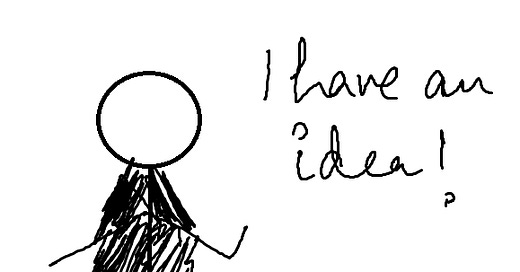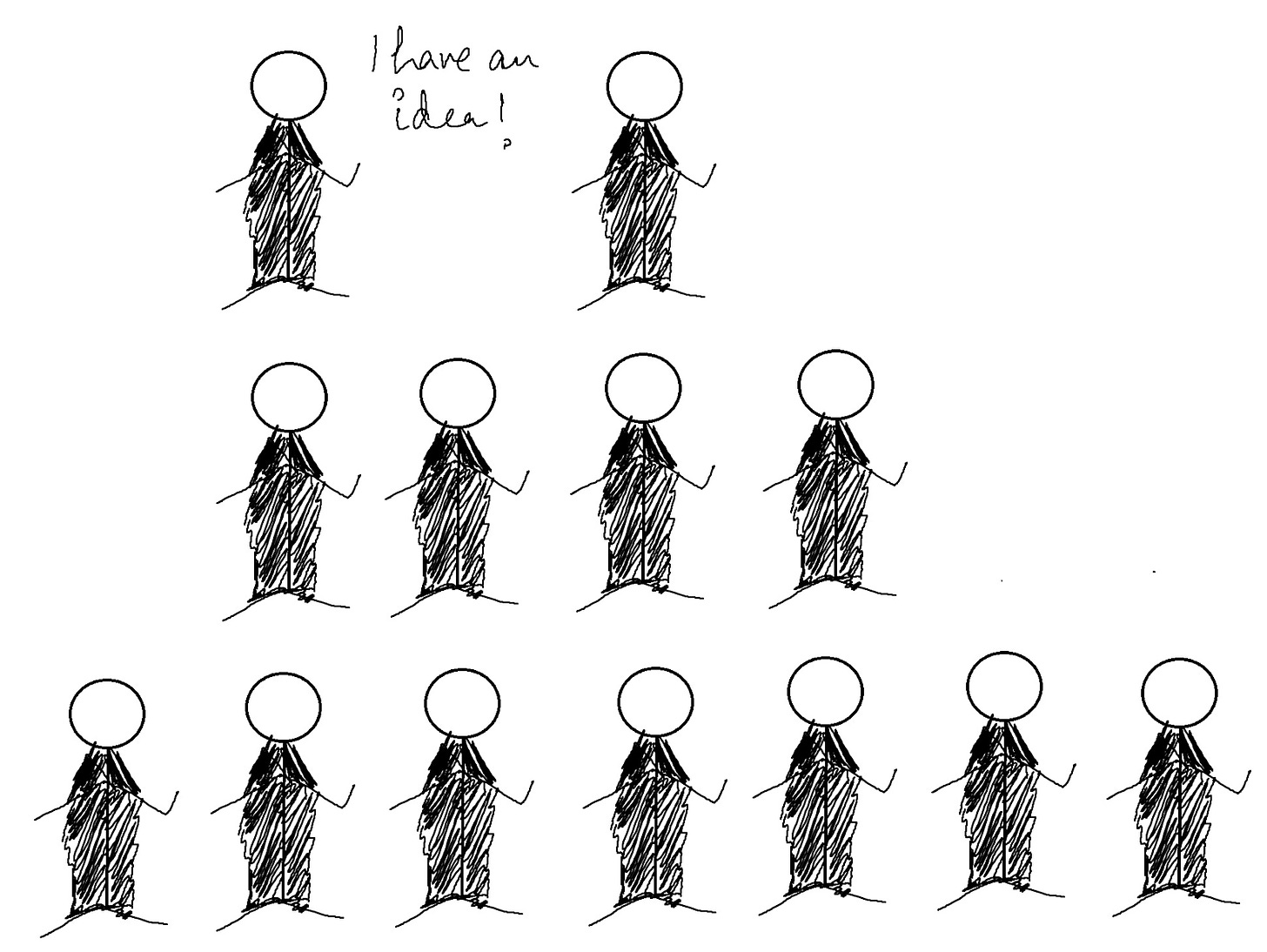With a whimper instead of a bang, we bid adieu to 2021. Part of the Canon around these parts is that learning is often self referential and oftentimes chaotic, which means we only know what we learnt after we did something. Considering it’s been Strange Loop’s first full year, its also a useful schelling point to look at the 80+ essays and 260k words, and see what we actually did.
By the way, I don’t usually do goals, but a change I’d like to do more of in 2022 is to interact with y’all much more! There’s been a request or three on ways to discuss fiction/ economics/ organisations/ miscellaneous. I’d like to figure out a way to do some of those together, so here’s an open call. When I started writing I did it as a solitary learning exercise, because intrinsic motivation is easier. It still remains a goal, but now we have a lot of us here, so maybe we can start building a bit more.
Mostly though, Happy New Year everyone! From the bottom of my heart, thank you for reading and sharing and commenting and emailing and podcasting. It truly made 2021 a great year, and we all know that was a hard job.
Onwards.
Building a resilient organisation
This formed a big chunk of what I thought about and explored. Part of it was because of the the decline and fall of institutions all around us in the past few years, and the impetus to better understand that. Part of it was also because this seemed incredibly important as a skill for us to collectively get better at.
This is also probably the best fleshed out idea at the moment, definitely canon, and worthy of a medium upgrade. I’m thinking of how to make them into a book the coming year, so please do let me know too if you’d be interested/ intrigued/ excited/ horrified/ lukewarm about it!
On the paths to come up with excellent ideas, helped by those around you, and the right confluence of technological and cultural factors. Social networks guide attention and act as gravitational attractors of talent to create a scenius. Eureka, clustering of geniuses
How important is education in this equation? There is a clear pipeline problem and our methods of standard measurement have failed. So it might be worth asking the question of how you become the best. Should you go to college? and Unbundling universities
On ideas actually being everywhere, even though our ability to capitalise on them seems harder. When ideas lay around for the plucking
And how our very conceptions of genius seems to revolve around tinkerers and puzzle solvers, and not thinkers. The mythology of genius
Armed with an idea, you start creating an organisation to build something. To create it though, you need a team. To find talent you need to know how and where to look, to know its contours. Beware though, if you're too stringent on hiring or over-focused on retention you will miss out on superstars. Measurement errors will inevitably overwhelm the signal. Why we fund teams and hire individuals and Spot The Outlier!
And as the organisation grows, and the people start interacting with each other, you need mechanisms for communication and coordination so you can persuade the team on the direction you need to take. The art and science of persuasion
Over time though, it seems the larger the organisation gets, the less effective or efficient it is. Not because of individual malice or incompetence, but through the sheer weight of organisational inertia. Combating organisational inertia
Four factors seem to substantially impact the increasing ossification of larger organisations - increasing burden of information transmission, inertia and increasing burden of rules and standardisation, and the increasing efforts of maintenance, and the loss of tacit knowledge.
As the organisation grows larger, parts of it get more specialised, which makes the information transmission within the organisation more complex. Therefore the coordination costs rise exponentially (or rather, combinatorially). This creates both ossification and resistance to change, and ability to be more efficient. Hierarchical growth trade-offs and Rising complexity and specialised paths to progress
People aren't their job descriptions, they're their job description + motivation to help the company succeed which helps them do more, different or better. Without a strong sense of mission to keep the inertia in check, you have to start relying on rules, which begets loss of excitement, which begets yet more rules in a downside spiral. Why do we dislike rules so much?
Once something is built, maintaining it becomes really important, and adds a non trivial amount of work at any moment. To build a longer lasting organisation requires constant maintenance of the organisation itself, to clean the barnacles from its hull and streamline it regularly, which isn’t exactly considered work worthy of top talent. Maintenance as innovation
Inside the company you'll be faced with another headwind, which is the loss of tacit knowledge as employees leave. There are types of knowledge that simply gets lost in the shuffle. When the network itself is the storage medium, its topological arrangements are incredibly important, and difficult to replicate. Two Stories About Tacit Knowledge
To grow, they need to figure out whether its best to just emulate the characteristics of seeming leaders in your industry, or whether its useful to actually find alpha by trying something new. This dilemma is exacerbated by the fact that anything new you do will eventually decay. Strategy Decay as an Institutional Problem
Innovation is usually the only way out to create a new S curve to capture and grow. To do that, you need to allow experimentation and create the right incentives for people
If you want something done as a one off, is best to get smart people, given carte blanche and let them figure out a way. Two Stories About Tacit Knowledge
To become the type of organisation that allows for innovation is also to be the type of organisation that believes it can't be top-down directed, and gives space for experimentation within the boundaries of the firm. Thinking Like A City
Creating space for growth requires space for executives to make decisions away from the limelight and the need for constant justification of every individual decision. Greedy Algorithms And The Need For Illegibility
To continue to be innovative, an organisation needs to become far more comfortable with ambiguity and need better information wrangling mechanisms. Why do big businesses seemingly suck at innovation?
To continuously innovate in the long term requires usually a willingness to sunset rules or subtract aspects from the org, more than its a question of finding the right additive solution. Meditations On Regulations: Quis Custodiet Ipsos Custodes
Some organisations do seem to defy the odds and act immortal, and they seem to do so by foregoing growth and focusing on a core need. This is something we need to study more. The price of immortality
For us to have long-lasting success, we need to be aiming for far more experimentation and try our hand at new ways of encouraging innovation. On Medici And Thiel
The macro view: the prize if we succeed
The above was the micro view, the practitioner’s viewpoint. Interspersed was the macro view; of innovation and resilient institutions and its impact on furthering progress. The canon again here is a combinatorial model of progress - which explains the long periods of stasis, the bursts of seemingly exponential growth, and the recent bout of stagnation. This is also a clear guide to keeping our systems functioning and for growth - i.e., closing the “output gap” to our potential.
In order to get broad based progress, we need to understand combinatorial growth that defines us. As the number of ideas in play increases, the potential growth also increases. This means current potential is a function of what's possible. A Theory of Progress: Standing On The Shoulders Of Giants
However with each increasing idea, it also increases the idea space that needs to be explored. This vastly increases the resources needed to find a good idea, which creates periods of stasis followed by periods of explosive growth. Punctuated equilibria theory of progress
That exploration has another point however, which is that each tech needs to mature before it can be combined with others. So even if you're looking in the right idea space you need to wait for that tech to mature before combining it. Isolated narratives of progress
This means that slowdowns in growth and innovation should occasionally happen while we explore the idea space to find good ideas, and soon as some fields mature entire new fields start being developed. The next S curve
This is something I plan to explore next year, along with historic glass bead games, storytelling, predictions about the future, and much much more!
See you on the other side. Happy New Year!






First suggestion: Make a discord server.
Second: I know I might have kicked this off around here, but I think more collaborative, or at least mutually responsive efforts would be productive.
Third: Meetups? Maybe?
https://www.upwork.com/freelancers/~01617f13d74f79e4d7
I am a documents layout and formatting expert. You can contact me to to put all the essays together in the right order into one word file, with the necessary formatting which will enable you to navigate to the essays and its sub-headings.